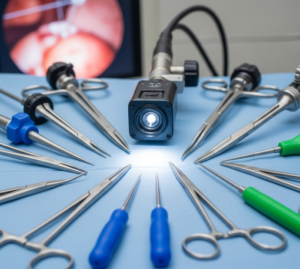The global minimally invasive surgery devices market was valued at USD 19.07 billion in 2024 and is projected to grow to USD 20.27 billion in 2025, reaching USD 34.93 billion by 2032. This reflects a compound annual growth rate (CAGR) of 8.1% during the forecast period. In 2024, North America led the market, accounting for a dominant share of 40.27%.
The minimally invasive surgery devices market is expanding rapidly due to rising demand for precision-driven, low-risk surgical procedures. Key segments such as endoscopic and robotic-assisted devices are gaining prominence owing to technological advancements and growing adoption in complex surgeries. Applications in orthopedics, cardiology, and gynecology are driving market growth, supported by the increasing incidence of chronic conditions and sports injuries. Hospitals and ambulatory surgical centers remain the primary end-users due to access to advanced infrastructure, while specialty clinics and training institutions are contributing to broader adoption across regions.
Continue reading for more details:
https://www.fortunebusinessinsights.com/minimally-invasive-surgery-devices-market-113274
Market Segmentation
- By product type, the Minimally Invasive Surgery Devices Market is segmented into handheld instruments, laparoscopic devices, electrosurgical devices, guiding devices, and endoscopic instruments.
- By application, the market includes cardiothoracic surgery, orthopedic surgery, gynecological surgery, cosmetic surgery, and gastrointestinal surgery.
- Based on end user, the Minimally Invasive Surgery Devices Market serves hospitals, ambulatory surgical centers, and specialty clinics.
- Technology segmentation includes robotic-assisted systems, video-assisted systems, and conventional minimally invasive devices.
List Of Key Minimally Invasive Surgery Devices Companies Profiled:
- Medtronic (Ireland)
- Johnson & Johnson Services, Inc. (U.S.)
- Koninklijke Philips N.V. (Netherlands)
- Boston Scientific Corporation (U.S.)
- Olympus Corporation (Japan)
- Stryker (U.S.)
- Braun SE (Germany)
- Steris (U.S.)
- Intuitive Surgical (U.S.)

Market Growth
- The Minimally Invasive Surgery Devices Market is expanding rapidly due to rising preference for procedures that reduce recovery time, hospital stay, and post-operative complications.
- Increasing incidence of chronic diseases such as cardiovascular disorders, orthopedic injuries, and cancers is driving demand for the Minimally Invasive Surgery Devices Market.
- Advancements in laparoscopic instruments, robotic-assisted surgery, and image-guided systems are boosting market adoption.
- Growing geriatric population and rising healthcare expenditure are further supporting Minimally Invasive Surgery Devices Market growth.
- Demand is also increasing due to patient awareness about the benefits of minimally invasive procedures over traditional open surgeries.
Restraining Factors
- High cost of advanced minimally invasive surgery devices limits adoption in resource-constrained healthcare settings.
- Lack of trained surgeons skilled in operating minimally invasive surgical systems slows Minimally Invasive Surgery Devices Market penetration.
- Limited availability of advanced infrastructure in developing countries restricts market expansion.
- Risk of device malfunction or technical errors during complex surgeries remains a challenge.
- Stringent regulatory approvals for new technologies can delay product launches in the Minimally Invasive Surgery Devices Market.
Regional Analysis
- North America leads the Minimally Invasive Surgery Devices Market due to advanced healthcare infrastructure, high patient awareness, and strong adoption of robotic-assisted systems.
- Europe shows robust growth supported by favorable reimbursement policies and rising demand for day-care surgical procedures.
- Asia Pacific is the fastest-growing region in the Minimally Invasive Surgery Devices Market due to expanding healthcare access, medical tourism, and increased surgeon training programs.
- Latin America is experiencing gradual adoption, supported by healthcare modernization and growing investments in surgical facilities.
- Middle East & Africa offers untapped potential as hospital infrastructure improves and awareness of minimally invasive techniques increases.